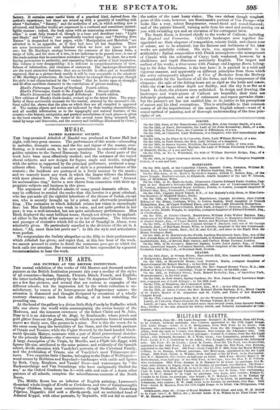MUSIC.
SACRED HARMONIC SOCIETY.
THE long-promised Atha/Ia. of Handel was produced at Exeter Hall last night, with very great success. The performance of this music—abounding in melodies, dramatic scenes, and the fire and vigour of the master, over- flowing, as it would seem, in his new speculation in oratorios—will bring golden opinions to the Sacred Harmonic Society. The choral parts of the work have been most effintively studied; and the entrance of the varied choral subjects, and new designs for fugues single and double, mingling with the action as supported by the principal performers, produced a mag- nificent effect. Variety and contrast of style is a prominent feature of the oratorio ; the incidents are portrayed in a lively manner by the music; and we scarcely know any work in which the hearer follows the libretto with More pleasure. Even the old pieces, "Gentle airs," and "Around let acclamations ring," derive a new charm from connexion with their ap- propriate subjects and business in this piece.
The argument of Athaliah admits of many grand dramatic effects. It may his sufficient to remind the reader that this heroine is a great criminal, who has put aside all the rightful inheritors of the throne of Judah, except one, who is secretly brought up by a priest, and afterwards proclaimed king. The recitative in which Athaliah relates her vision is exceedingly fine: but Miss Rainforth was weak in voice, and not quite perfect in her part; it was a well-intended, but not quite satisfactory performance. Miss Birch displayed the most brilliant tones; though not always to be applaud- ed either in the style of her cadences or in her intonation. The bravuras and passages of recitative which fell to the lot of Staudigl in Abner, were admirably given. He particularly excelled in the divisions of the air in A
minor, " cant thou but prove me ": in this the style and articulation were Perfect.
We congratulate the SoClety altogether on the fillip to their performances which Athaliah has given; and regret that, at this late hour of the week, we cannot proceed to notice in detail the numerous pass iges to which the book calls our attention. But comment will be best superseded by a general recommendation to hear the work.


























 Previous page
Previous page